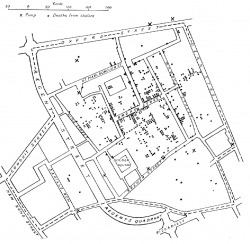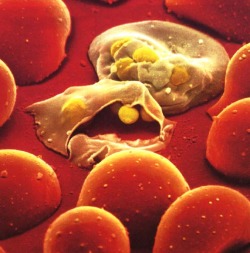Why Public Health?

Whenever I mention an interest in obtaining a public health degree, the question I always get is "But why?" My end goal is to obtain a medical degree, so this intermediate step tends to confuse people. I don't view public health as "inferior" or contrary to this end goal at all. The type of medicine I'd like to practice (infectious disease) ties in nicely with this option - my epidemiological degree from public health will provide me with a global perspective on the treatment of these diseases, as well as allow me to serve as a public health official with the ability to treat patients. Working for the CDC or WHO would be my ideal career, and this intermediate step of a public health degree allows me to begin working in this field.
But it goes a bit farther than that - I find the type of work that is done by public health officials, esp. epidemiologists to be exciting. It's sadly not a very common career choice, but in the words of my former advisor, "If you want to help a few hundred people overcome disease, become a doctor. If you want to help prevent disease in a few hundred thousand, go into public health." The combination of treating patients in a clinical setting with a means to prevent the global spread of that disease is a compelling idea, and an MPH (or MSPH, or MS) will allow me to realize this dream.
While nice, these reasons might strike the reader as a tad idealistic. There are also a number of practical reasons for pursuing a public health degree. First and foremost, the MPH forces you to learn biostatistics, which are invaluable in interpreting clinical studies. Secondly, it will make me a more attractive candidate, both in the workplace and in the medical school admissions process. In addition, the degree will allow me to gain more experience in the health field - and hopefully a better appreciation for the health care industry as a whole.
My Experience at the University of Michigan
The Application Process
One of the goals of this website is to provide hopeful public health students with some basic resources. I didn't have any when I tried to apply, and compared to information on medical school, the advice online tends to be vague. So at first, I'll be walking through my own application process, giving special insight into what I think I've done well, as well as what I could have done better.
I chose to apply to a total of five schools: The University of Alabama, Birmingham, Columbia University, Emory University, The University of Michigan, and the University of Washington. I applied to an MSPH whereever possible (only one school, but Epidemiology is heavy on the science, so the difference in programs is not huge) and if I met the experience requirements, I also applied to programs in Global Epidemiology. See list below for specific programs and acceptances to date.
University of Alabama, Birmingham School of Public Health: MPH in International Health and Global Studies (Epidemiology): Accepted! Declined offer in early February.
Mailman School of Public Health, Columbia University: MPH in General Epidemiology: Accepted! Offered $5,000 per term scholarship.
Rollins School of Public Health, Emory University: MSPH in Global Epidemiology: Accepted!
University of Michigan, School of Public Health: MPH in International Health (Epidemiology): Accepted! Offered 1/4 tuition merit scholarship.
University of Washington, School of Public Health: MPH in General Epidemiology: Accepted!
Final Decision: University of Michigan, School of Public Health, MPH in International Health Epidemiology.
All in all, I had a very successful application season. I think that my biggest mistake was applying to so many different schools - now I have a difficult decision ahead of me. in retrospect, I should focused more on specific programs rather than applying to some schools just to increase my chances of getting in somewhere. In general, I was surprised by how different the decision times were between the schools. UAB responded within 10 days, whereas Columbia waited until early march to send out their decision. This difference definitely put Columbia at a disadvantage - I had already spoken with professors at every other school, so Columbia fell off my mental radar, to the point where they needed to make a big offer to come back in, which they did not do. Their admissions department also seemed like they could not wait to get off the phone with me, so they didn't earn themselves any points there.
The decision came down to a mix of finances and program strength: the University of Washington had the strongest program in Epidemiology, the University of Michigan had the better International Health program, and Emory had connections with the CDC - so they were all even here. Financially, they all would have cost the same given the scholarships I was offered, but it is easier to get funding for the 2nd year at the Universities of Michigan and Washington, so they had a slight advantage there. Michigan ended up taking the lead for it's International Health opportunities (I was not eligible for these at the University of Washington) and the amazing friendliness of it's faculty and staff - the head of the International Health Program called me a few times to discuss career options and my concerns with the school, which impressed me greatly. I'm looking forward to my time there and hope to learn a lot and have some great experiences.
General Information
So you want to apply for a master's in public health? If you're like me, you have no clue where to begin. At first, familiarize yourself with SOPHAS. From this site, you can gain information on what public health is and the different degree options (they can range from pure science/math to hospital administration). After you've familiarized yourself with the programs and the field of public health (assuming you don't work in the field already), it's time to search for schools of public health. While many schools allow an application to be submitted through SOPHAS, others don't, so don't assume that your school of choice will use SOPHAS. In addition, the prerequisites for programs vary wildly. For example, to apply for an MPH or MSPH at Johns Hopkins, one needs two years of public health experience or an M.D., D.O., or equivalent degree, but Emory does not require such prerequisites. If you can't get an MPH or MSPH at your school of choice, they will sometimes offer an MS in the same field. Prerequisites for these MS degrees are usually not nearly as strict. See Rankings for a list of the top 20 schools of public health and links to the school's page.
First Steps - Letters of Recommendation and Personal Statements

Now that you've chosen your list of schools, it's time to start the applications. Open an account with SOPHAS and any schools not in SOPHAS and fill in basic personal information. Now is the time to start thinking about your Personal Statement and Letters of Recommendation. I applied to Emory, Columbia, the University of Michigan, the University of Washington, and The University of Alabama, Birmingham, so the advice from here on will focus mainly on the MSPH/MPH degree in Epidemiology or Global Epidemiology at these schools. For your references, choose professors and supervisors - not friends and family - who can speak to your skills, interest and academic potential. For example, your faculty advisor will be a much better choice than that Professor whose class was taught by a TA. One thing that Admissions Committees (AdComs) are looking for here is if you made an impression on a supervisor or faculty member - if your reference doesn't know you well, s/he can't speak to this or write you a good letter. You should have 3-5 references - more than this is too many and will likely only serve to annoy the admissions committee. If it's been awhile since you've seen or talked to one of your references, send them an update letter as well as a current CV (more on that in the next section).
For my application, I asked both of my major advisors (one Molecular Biology, one German Studies), one supervisor at a lab worked for the summer of 2008, and the volunteer coordinator at the hospital I volunteered at. All of these people were familiar with my work, I was on very good terms with all but one, and all of them could speak at least somewhat to my personality. Another advantage is that they represent a fairly diverse spectrum of activities. Getting letters from only lab supervisors or classroom instructors will not give the AdCom a broad view of you as a person. Since good applicants are well-rounded (diversity is crucial for admissions these days, and that does NOT only mean racial diversity), your letters should show a range of interests.
Now that you've (hopefully) got your references lined up, it's time to start on your personal statements. Yes, there will be more than one. The admissions process for public health is not as streamlined as that for college or medical school, and individual departments within a school often have different personal statement requirements. As requirements differ, it's unlikely that you'll be able to "cut and paste" one essay verbatim. This does not mean that you have to write essays that are totally different though - come up with an outline and a basic format that you can modify based on length or content restrictions. Some general guidelines for your statement follow:
1. Write it yourself - AdComs can tell if you paid someone else to write your essay for you. On the other hand, you are never your own best editor. The more readers and comments you get, the stronger your essay will be. 2. Don't take criticism personally - Your editors are trying to help you. It's much better that they find a glaring error before the AdCom does.
3. Tell a story - Don't write out a laundry list of your accomplishments - that's what the rest of your application is for. DO use the personal to explain why public health is your career choice using one or two well-written, compelling examples. Coming up with this "kernel" is often the hardest part - it requires introspection, creativity, and sincerity. Fortunately, these are qualities that AdComs like to see.
4. Do your homework - Explain how the school you are applying to is the right fit for you.
5. Proofread - Then do it again. Be on special lookout for the passive voice (the active voice is both stronger and less wordy). Grammar flaws are simply not acceptable. Most schools do not require interviews, so this statement is your only chance to make a good impression.
6. Start Early - Each of these steps takes time, and there will be a significant difference between a personal statement written in 6 hours to meet a deadline and one written over 2 months.
I will post a copy of my personal statement once decisions have been made so that there will be an example (the process is not nearly as well-defined as the personal statement for medical school).
Writing your CV

The good news is that the public health school application process has essentially three components - letters of recommendation, a personal statement, and a CV. A CV (curriculum vitae for the Latin scholars) roughly translates to "Course of Life" and is really just an extended resume. While the gold standard for resumes is one page only, CV's have no real length limit. However, this is not a license to turn it into an essay. You should begin with basic personal information, then have a section on Education. Follow this section with one containing work/research/significant volunteer experience. Dates, supervisors, and a brief summary of skills (active voice only!) should be under each job listing. Sections for Publications, Presentations, Awards/Honors, Teaching Experience, and Skills can follow, but these sections are by no means mandatory. There are many examples online, and I recommend finding a style you like then modifying it to make it your own. You can find my CV here. Never use a template - using one implies a lack of creativity and in some cases can even get your CV thrown out without being carefully considered.
Once you have your CV written, fill in the rest of the application - it should be much easier! The subsections will allow to expand on material you briefly touched on in your CV, but the CV provides a nice template to ensure that you don't leave out any important information. Congratulations! Your application should be done. Now step away from it for at least 2 days, and check it one more time for any typos, grammatical errors, or misspellings. Manuals of style and dictionaries are your friend, as is a good editor. Once you think your application is perfect, check it one more time, then submit it.
Keeping it all organized.
By now, it's likely that you have applications open at 4-10 different schools, each with different deadlines and possibly different application systems. Organization is key to ensuring that you don't leave anything out. I am keeping two forms of organization active - a spreadsheet and a OneNote file. The OneNote allows me to collect screenclippings so that I can keep up with all the requirements in one location - even when I'm offline. The spreadsheet allows me to keep track of when I submitted what to where, as well as unpaid fees and additonal requirements. If you've got your organization system ready, you'll be sure that you haven't missed a crucial step and you can keep up with additional requests easily.

Somewhere Else by Somewhere Else is licensed under a Creative Commons Attribution-Noncommercial-No Derivative Works 3.0 United States License.
